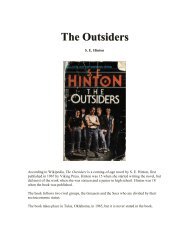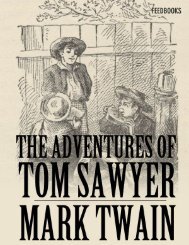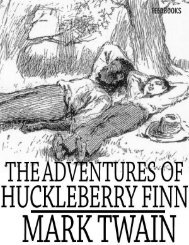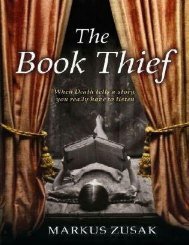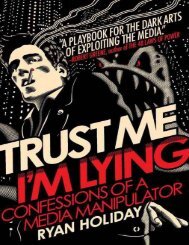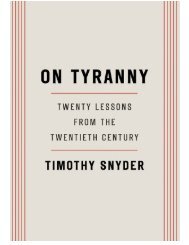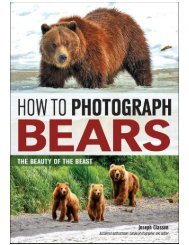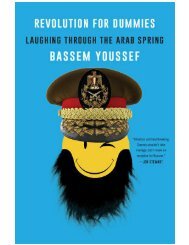You also want an ePaper? Increase the reach of your titles
YUMPU automatically turns print PDFs into web optimized ePapers that Google loves.
tolerance. Our people often quote the famous speech he made a few days before independence: ‘You<br />
are free to go to your temples, you are free to go to your mosques or to any other place of worship in<br />
this State of Pakistan. You may belong to any religion or caste or creed – that has nothing to do with<br />
the business of the state.’ My father says the problem is that Jinnah negotiated a piece of real estate<br />
for us but not a state. He died of tuberculosis just a year after the creation of Pakistan and we haven’t<br />
stopped fighting since. We have had three wars against India and what seems like endless killing<br />
inside our own country.<br />
We Muslims are split between Sunnis and Shias – we share the same fundamental beliefs and the<br />
same Holy Quran but we disagree over who was the right person to lead our religion when the<br />
Prophet died in the seventh century. The man chosen to be the leader or caliph was Abu Bakr, a close<br />
friend and adviser of the Prophet and the man he chose to lead prayers as he lay on his deathbed.<br />
‘Sunni’ comes from the Arabic for ‘one who follows the traditions of the Prophet’. But a smaller<br />
group believed that leadership should have stayed within the Prophet’s family and that Ali, his son-inlaw<br />
and cousin, should have taken over. They became known as Shias, shortened from Shia-t-Ali, the<br />
Party of Ali.<br />
Every year Shias commemorate the killing of the Prophet’s grandson Hussein Ibn Ali at the battle<br />
of Karbala in the year 680 with a festival called Muharram. They whip themselves into a bloody<br />
frenzy with metal chains or razor blades on strings until the streets run red. One of my father’s friends<br />
is a Shia and he cries whenever he talks about Hussein’s death at Karbala. He gets so emotional you<br />
would think the events had happened just the night before, not more than 1,300 years ago. Our own<br />
founder, Jinnah, was a Shia, and Benazir Bhutto’s mother was also a Shia from Iran.<br />
Most Pakistanis are Sunnis like us – more than eighty per cent – but within that we are again many<br />
groups. By far the biggest group is the Barelvis, who are named after a nineteenth-century madrasa in<br />
Bareilly, which lies in the Indian state of Uttar Pradesh. Then we have the Deobandi, named after<br />
another famous nineteenth-century madrasa in Uttar Pradesh, this time in the village of Deoband. They<br />
are very conservative and most of our madrasas are Deobandi. We also have the Ahl-e-Hadith<br />
(people of the Hadith), who are Salafists. This group is more Arab-influenced and even more<br />
conservative than the others. They are what the West calls fundamentalists. They don’t accept our<br />
saints and shrines – many Pakistanis are also mystical people and gather at Sufi shrines to dance and<br />
worship. Each of these strands has many different subgroups.<br />
The mufti on Khushal Street was a member of Tablighi Jamaat, a Deobandi group that holds a huge<br />
rally every year at its headquarters in Raiwind, near Lahore, attended by millions of people. Our last<br />
dictator General Zia used to go there, and in the 1980s, under his regime, the Tablighis became very<br />
powerful. Many of the imams appointed to preach in army barracks were Tablighis and army officers<br />
would often take leave and go on preaching tours for the group.<br />
One night, after the mufti had failed to persuade our landlady to cancel our lease, he gathered some<br />
of the influential people and elders of our mohalla into a delegation and turned up at our door. There<br />
were seven people – some other senior Tablighis, a mosque keeper, a former jihadi and a shopkeeper<br />
– and they filled our small house.<br />
My father seemed worried and shooed us into the other room, but the house was small so we could<br />
hear every word. ‘I am representing the Ulema and Tablighian and Taliban,’ Mullah Ghulamullah<br />
said, referring to not just one but two organisations of Muslim scholars to give himself gravitas. ‘I am<br />
representing good Muslims and we all think your girls’ school is haram and a blasphemy. You should







